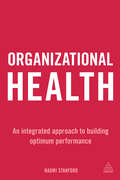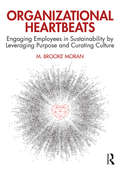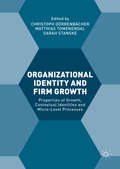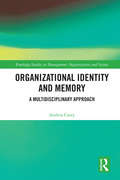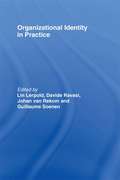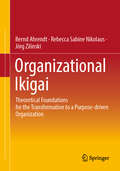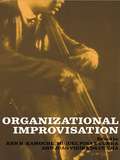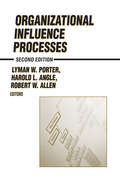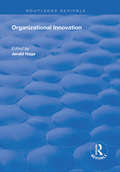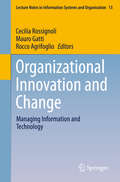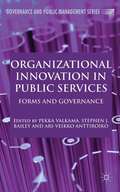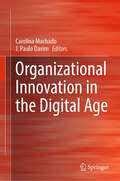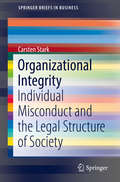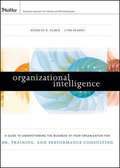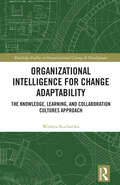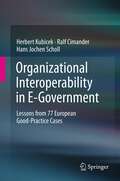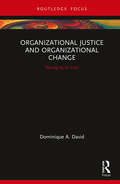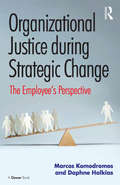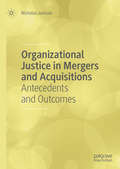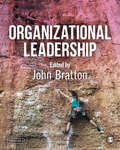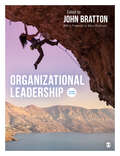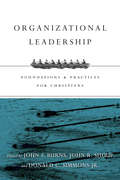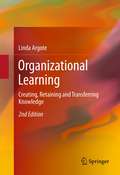- Table View
- List View
Organizational Health
by Naomi StanfordOrganizational Health is an organization's ability to function effectively, to cope adequately, to change appropriately, and to grow from within. A healthy organization is just that in all its aspects: people, process, structures, systems, behaviours and governance. It is one where appropriate adaptive, maintenance and development activities are integral to maintaining performance and alignment in the operating environment. Organizational Health takes an informed look at the critical and interdependent elements of an organization that must be maintained in a healthy state for managers to meet their business goals. Using a practical, structured approach it l covers: understanding and assessing organizational health; the impact of structures on organizational health such as hierarchies, alliances and joint ventures; control methods such as corporate governance, ethics and compliance; maintenance and development including OD, change management, learning and workplace environment; sustainability including carbon footprint and business ecosystems; indicators of health and dysfunction.
Organizational Heartbeats: Engaging Employees in Sustainability by Leveraging Purpose and Curating Culture
by M. Brooke MoranThis employee engagement book focuses on the HOW of engaging employees in sustainability through four diverse case studies, thought-prompting questions and tips, as well as a unique model of employee engagement to guide strategy. The book includes both the mechanics of engagement and also the art of engagement through practices of authenticity, collective leadership, curating culture, and leveraging purpose. The power of purpose-driven employee engagement efforts featured in this book will inspire readers to help employees thrive, as a by-product of doing so is retaining employees, who effectively drive strategy, which lifts the organization and bolsters the economic bottom line. Numerous examples of successful engagement initiatives at Dubai Chamber of Commerce and Industry, Arizona State University, Seventh Generation, and Danone North America will catalyze readers’ imaginations regarding what is possible at their organizations. Moran’s purpose-driven employee engagement model will guide readers and their teams to hone initiatives into ones that will align with the heart and the systems of the organization. Prompting tips and questions throughout the text invite readers to engage with the material, so it is advised to have a notebook to record ideas while reading. Whether sustainability directors, human resource or talent management professionals seeking guidance on how to engage employees, middle managers striving to drive organizational change, or business school students wanting to learn about purpose-driven organizations, this book provides myriad tangible resources, as well as inspiring cases, to support the human capital that serves as the heart of organizations.
Organizational Identity and Firm Growth
by Christoph Dörrenbächer Sarah Stanske Matthias TomenendalThis edited volume focuses on the interplay between organizational identities and firm growth, an area which remains largely unexplored. Firm growth in its various forms is omnipresent in the contemporary business environment, but does not always lead to positive results. At the same time, some organizations are growing faster than their peers, leading to questions of organizational growth antecedents. In addition to the dominant economic reasons in strategic literature, the volume seeks to integrate psychological aspects to the discourse, thereby considering the micro, meso and macro level. By providing both insights into international academic thinking and into practical examples of small and medium-sized companies in Berlin, the authors identify new findings concerning successful growth strategies.
Organizational Identity and Memory: A Multidisciplinary Approach (Routledge Studies in Management, Organizations and Society)
by Andrea CaseyOrganizational Identity and Memory analyzes the relationship between organizational identity and organizational memory, in particular history and commemoration. The goal is to further our understanding of the role of this relationship in processes critical to today’s organizations: the evolution of organizational identity, the creation and use of organizational memory, organizational learning and change, and employee identification with organizations. The literature on organizational memory and organizational identity has developed independently and at times in separate disciplines. Scholars have debated whether organizational identity is mutable or enduring. In this debate, organizational history, a form of organizational memory, has been a key factor, but neither side of the debate has pursued indepth the well-developed literature on collective memory to understand this relationship and its impact on organizational identity. Organizational memory defined as commemoration and history has been connected to different forms of identity, both national and organizational, but this relationship and its impact on organizational memory processes has not been explored. Organizational Identity and Memory takes a multidisciplinary approach to explore and articulate the dynamic relationship between organizational identity and memory, drawing on work from anthropology, history, organizational studies, and sociology. A multidisciplinary theoretical framework for future research on organizational identity and memory is presented. Implications for managers are discussed with engaging insights from organizational research and practices in creating corporate museums, galleries, visitor centers, and other displays of this relationship.
Organizational Identity in Practice
by Guillaume Soenen Lin Lerpold Davide Ravasi Johan Van RekomOrganizational Identity in Practice provides much-needed, in-depth studies on what happens when aspirations, claims and beliefs interact. Given the practical needs of managers and students, this exciting new text provides readers with more insight into what differences in these identity aspirations, claims and beliefs really mean and what we may expect to occur when these differences become visible and what the outcomes of these processes are likely to be. The diverse case studies illustrate how well-known firms have dealt with the broad issues of "who we are as an organization" and "what makes us similar or distinct from others" and cover a broad range of industries, firms, and organizational forms. The cases from companies such as Air France, AT&T, Bang & Olufsen, BP, Statoil, Starbucks, Scania and Alfa Romeo are focused on the broad topics of organizational identity, strategy and the environment, multiple and conflicting identities, the construction of identities, and how organizations express and project their identities. The authors give scholars, students and managers valuable ideas on how to deal with organizational identity challenges within firms.
Organizational Ikigai: Theoretical Foundations for the Transformation to a Purpose-driven Organization
by Bernd Ahrendt Rebecca Sabine Nikolaus Jörg ZilinskiOrganizations are increasingly faced with the challenge of recruiting and retaining suitable personnel. It is crucial to have employees who are committed to their organization and actively support change. Such commitment is primarily present when employees find suitable framework conditions for themselves that result from the lived values that are anchored in the organizational culture. Accordingly, a culture must be based on an image of human man that is worthy of man. An image of man worthy of man is reflected in Ikigai. Ikigai pursues a meaning-centered approach (purpose-driven) and – based on the original logotherapy of Viktor E. Frankl – assumes that the core motivation of human beings is the search for meaning. The book lays the theoretical foundation for a comprehensive individual and organizational consideration of Ikigai by describing Ikigai as a Japanese philosophy of life and, on the basis of original logotherapy, opening up Ikigai for the non-Japanese cultural area. The necessity of a purpose driven view is explained and individual Ikigai is transferred to the organizational context as a blueprint. The four central levers of organizational Ikigai are described and the theoretical foundations for a transformation to a purpose-driven organization are presented.
Organizational Improvisation
by Miguel Pina Cunha Ken KamocheThe relatively new field of organizational improvisation is concerned with the pressures on organizations to react continually to today's ever-changing environment. Organizational improvisation has important implications for such subjects as product innovation, teamworking and organizational renewal, and this new book brings together some of the best and most thought-provoking papers published in recent years. This area is now emerging as one of the most important in organizational science, and this book provides a comprehensive collection suitable for students, researchers and practitioners alike.
Organizational Influence Processes
by Lyman W. Porter Robert W. Allen H.L. AngleWith more than two-thirds fresh material, this new updated edition of Organizational Influence Processes provides an overview of the most important scholarly work on topics related to the exercise of influence by individuals and groups within organizations. In selecting articles for inclusion the editors were guided by the conviction that the most useful and interesting way to view organizational influence is to take a directional approach - that is, to consider the process from the perspective of downward, lateral, and upward influence. They have organized the readings around this framework, preceded by an introductory group of articles dealing more generally with the nature of influence processes and power. The book includes both classic readings and the latest cutting edge research from some of the most respected experts writing in the field. It will be equally useful for any upper level undergraduate or graduate course concerned with organizational behavior, group behavior, leadership or power and politics.
Organizational Innovation (Routledge Revivals)
by Jerald HagePublished in 1998. In the past year the 300 largest global companies increased their research budgets by an average of 12 per cent. Governments now measure how technologically advanced they are as they worry about their trade balances and unemployment. Many public sector organizations, for example hospitals, universities and welfare agencies, are struggling to keep up with the rate of technological progress. The selections in this book provide a number of insights on how private firms can be more innovative and public sector organizations can keep up with rapid technological change. They emphasize both radical and incremental innovations and both product and process innovation. In particular the advanced manufacturing technologies so central to Piore and Sabel’s ’Second Industrial Divide’ receive a great deal of attention. Finally, the consequences of innovation are the focus of the last section.
Organizational Innovation and Change
by Cecilia Rossignoli Rocco Agrifoglio Mauro GattiThis book explores a range of critical issues and emerging topics relevant to the linkages between information technologies and organizational systems. It encourages debate and opens up new avenues of inquiry in the fields of Information Systems, organization and management studies by investigating selected themes of growing research interest from multiple disciplinary perspectives such as organizational innovation and impact, information technology, innovation transfer, and knowledge management. The volume is divided into two sections, each of which focuses on a specific theme: ICT, organizational innovation and change; and ICT and knowledge management. The content of each section is based on a selection of the best papers (original double-blind peer-reviewed contributions) presented at the annual conference of the Italian chapter of the AIS, held in Genoa, Italy in November 2014.
Organizational Innovation in Public Services
by Pekka Valkama Stephen J. Bailey Ari-Veikko AnttiroikoIn the wake of the economic crisis, many public services are facing a challenging environment in which they receive less funding but are expected to deliver better services. Organisational Innovation in Public Services develops new theoretical models and analyses case studies to provide an important insight into how to modernise public services.
Organizational Innovation in the Digital Age
by J. Paulo Davim Carolina MachadoThis book focuses on how businesses manage organizational innovation processes. It explores the innovative policies and practices that organizations need to develop to allow them to be successful in this digital age. These policies will be based on key resources such as research and development and human resources and need to enable companies to respond to challenges they may face due to the digital economy. It explains how organizational innovation can be used to improve business’s development, performance, conduct and outcomes. Contributing to stimulate the growth and development of each individual in a dynamic, competitive and global economy, the present book can be used by a diverse range of readers, including academics, researchers, managers and engineers interested in matters related with Organizational Innovation in the Digital Age.
Organizational Integrity: Individual Misconduct And The Legal Structure Of Society (Springerbriefs In Business Ser.)
by Carsten StarkThis book describes the results of a research project on compliance and organizational integrity, financed by the German government and conducted over the last three years. The book offers a theoretical framework and valid instruments for measuring the outcome of compliance management: organizational integrity. To pinpoint the specifics of organizational integrity, and to create a framework for assessment, the book analyzes not only the cases of Siemens and Deutsche Bank but also a specific form of organization: governmental organizations. The book includes the results of a survey of employees in five German cities, in the course of which the author conducted interviews with the personnel responsible for compliance in different organizations. In addition, during their discussions he analyzed the administrative staff with regard to the decision-making processes they were involved in.
Organizational Intelligence
by Lynn Kearny Kenneth H. SilberThis book provides professionals with a clear, simple model for understanding the business of the organizations in which they work, analyzing organizational performance problems, and explaining their ideas in business language. It includes a wealth of worksheets that help to identify the key issues facing the organization, identify the key measures, determine the current and desired states of those measures, determine the gaps in organization performance, communicate those gaps and their solutions to management in language that management understands. Co-published with ISPI, this resource is written for training/HPT/ID/OD/HR professionals.
Organizational Intelligence for Change Adaptability: The Knowledge, Learning, and Collaboration Cultures Approach (Routledge Studies in Organizational Change & Development)
by Wioleta KucharskaThis book offers a pioneering exploration of how the synergy between knowledge, learning, and collaboration (the KLC approach) drives organizational intelligence and adaptability. Grounded in empirical research and case studies, it examines how the impact of the KLC approach varies based on company culture (adhocracy, clan, market, and hierarchy) and management levels (team, division and organization).Readers will discover actionable strategies for fostering collective intelligence and adapting to change, especially in the context of remote work and AI-driven environments. The book highlights the critical role of leaders as architects of company culture and provides practical guidance for aligning culture with business goals. Case studies bring the concepts to life, offering valuable lessons for designing and sustaining a growth-agile mindset.This research-rich volume is an essential resource for researchers, academics, and students in organizational change, knowledge management, and strategy, as well as business leaders seeking to enhance their company’s collective intelligence and adaptability.
Organizational Interoperability in E-Government: Lessons from 77 European Good-Practice Cases
by Herbert Kubicek Hans Jochen Scholl Ralf CimanderIn the e-government research community as well as in many national e-government programs, interoperability is widely seen as a key factor in developing effective and attractive e-services. There is also agreement that interoperability encompasses not only mere technical standards and interfaces, but also includes organizational, legal, and cultural aspects. Several interoperability frameworks have been introduced on national and international levels, and recommendations have been made for the adaptation of enterprise architectures in the public sector. Common to all these approaches is their top-down deductive procedure, which does not connect very well to the real world of e-government projects. In contrast, in this volume, which is based on empirical research, the authors introduce a bottom-up inductive approach to deal with the challenges of interoperability-related governance. Based on so-called "good-practice" cases of interoperability in e-government, they derive concepts and classifications that help to uncover and assess similarities and differences between the cases. As a result, they present an empirically based conceptual framework that details the options for IT governance of interoperability in government. In addition, their findings also make it possible to critically assess and improve other existing frameworks. With this work, which combines different thematic foci as well as a European and a US background the authors situate empirical results in the broader context of theoretical and political reflection. Thus they provide insights into strategic choices for CIOs in e-government at a national or regional level, experiences and lessons learned for managers and developers in e-government projects, and a huge set of empirical data for administrative and political scientists.
Organizational Justice and Organizational Change: Managing by Love (Routledge Focus on Business and Management)
by Dominique A. DavidAlthough various factors contribute to failed change, one of the key reasons for change failure is the inability of leaders to gain the trust of employees, to understand the interaction between their subordinates, and to convince them to support change and to commit the energy and effort necessary to implement it. The aims of this book are to establish theories in order to describe and explain how human behaviors and contexts interact dynamically in these changes, and manage change and justice by reducing inequalities, giving emphasis to distributive justice. In addition, the aim of this book is also for readers to better understand employees' perceptions of organizational justice by senior management which is particularly important during the organizational change because change cannot succeed without the acceptance and support from employees. Organizational Justice and Organizational Change: Managing by Love provides readers a theoretical understanding and recommendations for acting properly in an organization, forming a comprehensive tool and better enable practitioners to achieve management of change and justice in organizations. It will be of interest to researchers, academics, practitioners, and students in the fields of change management, organizational studies, leadership, and strategic management.
Organizational Justice during Strategic Change: The Employee’s Perspective
by Daphne Halkias Marcos KomodromosOrganizational leaders often struggle to establish and sustain a trusting culture in times of constant changes in the corporate fabric and unethical behavior by corporate leadership. Organizational justice theory provides a means to explain and better understand employees’ perceptions of trust, fairness, and the management of change during strategic change. Qualitative studies have yet to be conducted on how an organizational justice framework would address the need of organizational justice for novel, conceptually derived accounts of non-managerial employee perspectives. The purpose of Organizational Justice during Strategic Change is to be both an academic and practical book. After presenting the theoretical elements of the topic, half the book is devoted to a detailed case study of employee interviews conducted in a large, privately-owned media organization addressing the issues of the book topic. The authors’ research findings from the case study indicated employees who experience trust and positive feelings regarding their treatment within the organization are willing to become involved in the change process and adopt positive working relationships with their colleagues and managers. This study is important for organizational management to gain knowledge and understanding on how employees’ perceptions of distrust and unfairness can lead to resistance and negative behaviors toward organizations and management during strategic change.
Organizational Justice in Mergers and Acquisitions: Antecedents and Outcomes
by Nicholas JacksonThis book provides a unique account of how perceived justice is influenced by various aspects of an organizational merger and investigates the impact on behavior for those involved in the process. Drawing from both psychological and sociological insights, the author considers justice from an individual and group perspective in light of the political and strategic implications of mergers and acquisitions. Experiences from two empirical cases are used to consider the depth of theoretical analysis provided, in terms of practical outcomes for both organizations and employees alike. In this pioneering new book, the author explores communication, employee attitudes, trust and commitment, and the psychological contract between the employee and the organization, emphasizing the importance of developing a new meaning of organizational culture. Although primarily aimed at an academic audience, this book will also be useful to practitioners as it illuminates the potential pitfalls of overlooking the importance of fair treatment in the workplace.
Organizational Leadership
by John BrattonOrganizational Leadership provides an accessible, critical and engaging analysis of what constitutes &‘leadership&’ today. Demonstrating leadership as an interconnected process between leaders, followers and context, the book ensures a rounded understanding of theory and practice to support students throughout their course and future career. Part 1: Contextualising Leadership examines the internal and external forces influencing leadership, addressing issues such as ethics, power, culture and innovation. Part 2: Leadership Theories reviews and analyses traditional and contemporary theories of leadership. Part 3: Managing People and Leadership builds on the idea of leadership as a human process and considers how complementary aspects of HRM can inform leadership practice and its outcomes on employees and organizational performance. Part 4: Contemporary Leadership considers topical issues including the shift of leadership studies towards followership, gender and leadership and pro-environmental leadership. Bringing complex theories and concepts to life through a range of case studies and examples, the book is further supported by a series of fascinating expert video conversations with those in leadership roles. From small social businesses to major multi-nationals, from the NHS to the frontline military teams, the videos offer a unique insight into the diverse reality of leadership in practice today.
Organizational Leadership
by John BrattonOrganizational Leadership provides an accessible, critical and engaging analysis of what constitutes &‘leadership&’ today. Demonstrating leadership as an interconnected process between leaders, followers and context, the book ensures a rounded understanding of theory and practice to support students throughout their course and future career. Part 1: Contextualising Leadership examines the internal and external forces influencing leadership, addressing issues such as ethics, power, culture and innovation. Part 2: Leadership Theories reviews and analyses traditional and contemporary theories of leadership. Part 3: Managing People and Leadership builds on the idea of leadership as a human process and considers how complementary aspects of HRM can inform leadership practice and its outcomes on employees and organizational performance. Part 4: Contemporary Leadership considers topical issues including the shift of leadership studies towards followership, gender and leadership and pro-environmental leadership. Bringing complex theories and concepts to life through a range of case studies and examples, the book is further supported by a series of fascinating expert video conversations with those in leadership roles. From small social businesses to major multi-nationals, from the NHS to the frontline military teams, the videos offer a unique insight into the diverse reality of leadership in practice today.
Organizational Leadership
by John BrattonUnderstand the reality of contemporary organizational leadership with the second edition of this thought-provoking textbook. Through an analysis of key theories and topical issues such as innovation, gender, power, ethics and environmental sustainability, the authors deftly illustrate how leadership cannot be extricated from the wider organizational context and why leadership is increasingly seen as a shared endeavour between leaders and followers. The book has been fully updated, with a new introduction discussing the challenges faced by leaders during the Covid-19 pandemic as well as a Foreword by Mary Robinson. NEW to this edition: A new chapter on Team Leadership looks at team dynamics, the role of technology in teamworking and the challenges arising for virtual teams A new chapter on Leadership and Artificial Intelligence covers the rise of AI and big data, and how AI affects the employment relationship and leader-follower relations A new Ethical Spotlight feature in all chapters explores ethical issues faced by leaders and encourages reflection Suitable for undergraduate and postgraduate students studying leadership. John Bratton is Honorary Professor in the Management School at Queen′s University Belfast, Northern Ireland.
Organizational Leadership
by John BrattonUnderstand the reality of contemporary organizational leadership with the second edition of this thought-provoking textbook. Through an analysis of key theories and topical issues such as innovation, gender, power, ethics and environmental sustainability, the authors deftly illustrate how leadership cannot be extricated from the wider organizational context and why leadership is increasingly seen as a shared endeavour between leaders and followers. The book has been fully updated, with a new introduction discussing the challenges faced by leaders during the Covid-19 pandemic as well as a Foreword by Mary Robinson. NEW to this edition: A new chapter on Team Leadership looks at team dynamics, the role of technology in teamworking and the challenges arising for virtual teams A new chapter on Leadership and Artificial Intelligence covers the rise of AI and big data, and how AI affects the employment relationship and leader-follower relations A new Ethical Spotlight feature in all chapters explores ethical issues faced by leaders and encourages reflection Suitable for undergraduate and postgraduate students studying leadership. John Bratton is Honorary Professor in the Management School at Queen′s University Belfast, Northern Ireland.
Organizational Leadership: Foundations and Practices for Christians
by John R. Shoup Jack Burns Donald C. SimmonsKingdom leadership does not begin and end at the church door. Christians are called to conduct leadership in government, commerce, schools, neighborhoods, families, para-church ministries and a myriad other contexts. God has given us many gifts, and our responsibility is to be stewards of those gifts, and use them to do the King's work. In that context, this comprehensive text explores key facets of leadership from a Christian worldview so as to equip people to conduct leadership more authentically than would be possible under alternative paradigms. The book begins with the seldom considered theological foundations of leadership while also tracing the historic roots of management, organization and leadership theories. All of this leads to a robust discussion of five essential challenges and practices--communication, negotiation, decision-making, financial stewardship and personal development. The combined efforts of these experts in the field provide a practical theology of leadership from a Christian worldview for emerging and established leaders. Here is the foundation needed for those who want to conduct leadership in a manner consistent with their faith in both religious and nonreligious organizational contexts.
Organizational Learning
by Linda ArgoteWhy do some organizations learn at faster rates than others? Why do organizations "forget"? Could productivity gains acquired in one part of an organization be transferred to another? These are among the questions addressed in Organizational Learning: Creating, Retaining and Transferring Knowledge. Since its original publication in 1999, this book has set the standard for research and analysis in the field. This fully updated and expanded edition showcases the most current research and insights, featuring a new chapter that provides a theoretical framework for analyzing organizational learning and presents evidence about how the organizational context affects learning processes and outcomes. Drawing from a wide array of studies across the spectrum of management, economics, sociology, and psychology, Organizational Learning explores the dynamics of learning curves in organizations, with particular emphasis on how individuals and groups generate, share, reinforce, and sometimes forget knowledge. With an increased emphasis on service organizations, including healthcare, Linda Argote demonstrates that organizations vary dramatically in the rates at which they learn--with profound implications for productivity, performance, and managerial and strategic decision making.
